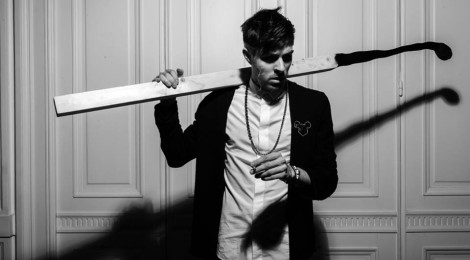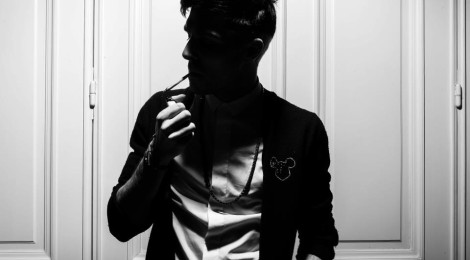
Just in time for Valentine’s Day Left Boy is releasing his long awaited debut album “Permanent Midnight“. Ferdinand Sarnitz aka Left Boy is not just a modern day rapper and singer walking the line between electro, r’n’b and pop. In terms of his career, the 25-year-old has benefited from today’s technological possibilities and has established a remarkable fanbase via social media and fun videos on YouTube. Although he now spends most of his time in the U.S., his gigs in Vienna are constantly sold out and he is definitely no stranger in major European cities, such as London and Paris. Left Boy explains why he took his time before rushing into releasing an album and more in an interview with Sebastian Fasthuber.
(Note: This interview is translated from German)

Two years ago, the magazine “The Gap” wrote about your career: “Left Boy has to decide whether to jump from a five or ten meter diving board”. Which did you choose?
Left Boy: I’m a fan of the one meter board. As for my career, I work on my projects as best as I can. I always try to give the people my very best. Whether watching my videos, going to my concerts, or listening to my album – I want them to have the best they can get.
Pop as a commodity?
Left Boy: No. I make music for myself, not for my fans. Essentially I am my own target group. Sometimes I am inspired by a song heard on the radio or in the credits of a movie. I then have to immediately work on this idea. And I will have no peace until I finish it. I am very fortunate that a lot of other people also seem to like my music. But I never question how the piece will come off. I’m too busy making the track work.
It took you a while to find the perfect time to release your album. Isn’t now a little late?
Left Boy: I don’t think so. I originally wanted to release it in summer 2013, that’s the deadline I set for myself. But now it’s become Valentine’s Day, which fits just as well.
It’s a pity that journalists couldn’t listen to the whole album beforehand, but only to excerpts. Why?
Left Boy: That’s the choice of the label. I don’t really know why. They only send out a fraction of the songs – probably to avoid the music going public before the official release. I also would have preferred if the journalists could hear the whole album.
Is it necessary to release an album to be successful these days? You have constantly filled venues without any released albums.
Left Boy: I think you just answered that question yourself.
Let’s talk about the brand Left Boy. How do you create such a hype?
Left Boy: I’m a huge music fan. My strategy from the beginning was to ask myself: What would I like to see my favorite act doing? That’s how I approach everything. In the beginning I only had a few hundred fans on Facebook. At 800 fans I posted that I would bring out a new song at the 1000 mark. This works both ways. My fans support me by generating new fans. And they also get something out of it. This was my first successful move in social media and this is how I still do it to this day.
Is it fun to be your own social media manager?
Left Boy: Yeah, I enjoy it. But sometimes I also need to step back for a while. If there’s nothing exciting to share, I’d rather not post on Facebook. You don’t have to post every single article or blog that has mentioned you. I have fanbases in England and Paris. I want to post things that speak to all and not just to one specific target group.
What is your audience like?
Left Boy: My audience is great. You should come to one of the concerts. They scream and yell so loud that I often can’t even hear myself. And not only to the songs with the videos. They know all the lyrics off by heart. I am tremendously grateful for my loyal fans.
You waited a long time until you showed yourself to the fans. What were the first concerts like?
Left Boy: I avoided live performances for a long time, because I thought I would never be able to convince the people live. I always thought I am cheating my fans. But I soon realized that concerts are not about musical perfection, but about the energy you radiate at a performance. My first gig was in March 2012, and since then I have played 30 to 40 concerts. I try to progress in every respect. And I have especially learned a lot regarding the live performance sector.
Are you a perfectionist?
Left Boy: Everything has to meet my quality standards. And for me everything is equally important. The show is just as important as the music, merchandise or the videos. I can’t neglect any aspect. That’s why I wreck my head for months about how to make the show more interesting and interactive – through projections, dancers, costumes or whatever. I also have some great visual designers in Switzerland called Supermafia. There are always problems that need to be solved. For example: What kind of effects work at festivals? If you are not the headliner, you perform at daylight and can’t use spotlights. And you only have 15 minutes for your stage setup. That’s why in the summer I always have my dancers, Urban Movement, with me. For weeks we work on weird productions for the show: clones, mirrors, blow-up sculptures.
That almost sounds like a complete work of art. Your father’s legacy can’t be denied.
Left Boy: I was always encouraged by my parents to try out everything that interested me. I learned a lot from my father in the show business, we talk about our projects every day.
What does he think about your music?
Left Boy: You would have to ask him.
Back to the beginning. How were you introduced to the world of hip-hop?
Left Boy: At first I wanted to be a breakdancer, then a DJ. Later I had the dream of becoming the best beatboxer. I was also quite good at it. When the program GarageBand for Apple came out, it changed my life. From then on I started to create my own beats and began to sample. This was around the age of 16.
How did Ferdinand Sarnitz become Left Boy?
Left Boy: As a child at the age of eight or nine, I drew a story about a small boy and a small girl. And it was called “Left boy looking for the right girl”.
You moved to the U.S. twice. It was not until the second time around that you were able to gain a foothold.
Left Boy: The first time in New York was really difficult. I thought it would be a lot easier. In my head I would just grab an internship at Def Jam and pass out my demos. I would then get the record deal and hang with Kanye West in the studio. But the reality was quite different and I moved back to Vienna after a year.
Did it feel like a setback to return to Vienna?
Left Boy: Totally. The first time I just didn’t work hard enough to build something up for myself in New York. This really gave me a tough time. In the following one and a half years in Vienna I therefore worked even harder on my music. One day, Max Papadop, a friend and director from New York, wrote to me that he would like to shoot a video for “Sunday Mornin’ Chillin'”. This got me back to New York, where I also found a bunch of new creative friends through him. I soon moved in together with these new friends, among them are two directors, an actress and a photographer. It is the perfect environment.
You all live and work under one roof?
Left Boy: Yes. It’s cool. We all support each other. If someone has an idea, he can knock on the next door at any time and we immediately try it out. The needed film and music equipment is all there and you can try whatever you want.
In these days with internet you can make it happen from anywhere. Does it have to be New York?
Left Boy: Of course you can make it from anywhere. But this distance to friends and family is important for my work. Here I can focus 100% on my music and don’t have to worry about not showing up for a birthday party or a family dinner.
It seems as if your videos were not created with huge budgets, but with funny ideas. Are the videos more than a promotion tool?
Left Boy: For me they are just as important as the music. If someone gives me three minutes of their time, I want them to see something great. Shooting and editing videos is a big passion of mine. I would like to study film to realize my ideas better. Unfortunately in this sector there is a lot of technical stuff that I don’t understand.
And you create your music all alone?
Left Boy: Before this album I did everything alone. In Los Angeles I then met the producer Nexxus with whom I reviewed all my songs. I taught myself how to produce, since I didn’t know any producers in Vienna. Today I’m grateful for that, because I don’t have to depend on anyone. I can realize my ideas by myself. My main focus is based on playing with music, exploring and experimenting. I try out all sorts of things and sometimes that creates a beat for my lyrics.
Your earlier pieces were heavily based on samples. Why has this changed?
Left Boy: This hasn’t changed, neither has my approach. I just sample straight on and my managers deal with clearing the rights. Over the years I have set aside my original compositions for the album, of which 50% are sampled songs.
Why did you sign with a major label? Is it because it’s easier to get the clearance for samples?
Left Boy: No, that’s not true. You have to assure the label that all samples are cleared when you turn in your music. I decided to work with majors to get local support in individual territories. It was also important for me to be financially independent from my family. Until recently I had only been investing. When something was left over, I reinvested it again, in the videos and shows.
Will 2014 be the first year making money?
Left Boy: For me it is all about making good music and videos. The money will then come in by itself.
Links:
leftboy.com
facebook.com/leftboymusic
twitter.com/LEFTBOY
Photos: Atelier Karasinski




